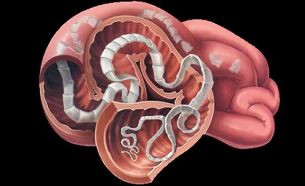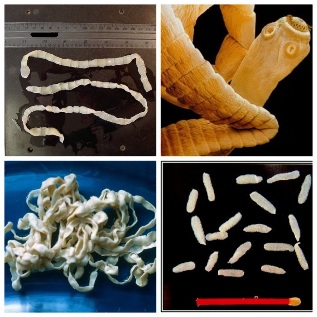
Intestinal parasites are the cause of various diseases, ailments, they interfere with full-fledged existence, negatively affect health. At the same time, many people guess about strangers in their bodies, but for some reason they do not want to be treated. According to world statistics, intestinal parasites are the cause of death for more than 15 thousand people a year. Scary numbers that are very easy to downgrade.
What parasites can settle in the intestines
In 80% of cases, parasites settle in the small and large intestines. From there, they can be transported to other organs. A person begins to experience pain in the liver, kidneys, stomach, undergoes therapy, not knowing the reason. But it is with the intestines that the study should begin. Who can live in it?
Helminths
Here are the types of helminths that are most common, they are easy to get infected by children and adults through contact with soil, dirty water, street animals or through food.
The most common types:
- bovine, pork, dwarf tapeworms - these parasites get to humans through infected meat, can live up to 20 years, grow up to 7 meters in length.
- roundworms are a common representative of nematodes or roundworms. Adults are white in color, reach a length of 35-40 cm. Ascaris eggs are tenacious, they can be stored for several years at low and high temperatures.
- whipworm is a common parasite that can easily be infected through unwashed hands, vegetables, soil, sand.
- toxocara - arrow-like parasites. Dogs are the source of infection, eggs are also found in sand, soil.
- intestinal flukes are flat flukes that are easily spread through fish.
- tapeworm is a flat tapeworm. You can get infected by swallowing eggs or larvae.
- shistosoma - worms that can enter the body through the skin. They cause severe allergies and mechanical damage to organ tissues.
- hookworm - injures internal organs.
- intestinal pretium - migrates through the vessels, then enters the lungs and lays eggs in the intestines.
- pinworms are the most common but less dangerous worms. They cause severe itching in the anus.
- trematode metagonimus - localized in the small intestine of a person who becomes infected by eating raw fish.
- anisakid - found in fish as coiled worms, can enter humans, causing gastrointestinal tract disorders.

All parasites in the intestines are light in color. If dark worms are found, you need to look for the reason in the diet. Perhaps the person used activated charcoal, grapes, beets, and took iron supplements.
Other parasites
- lamblia - they are less common in adults. These parasites multiply at an incredible rate, provoking abdominal pain, stool disturbance, and insomnia. The child begins to lose weight, is often naughty. You can get infected in water bodies, through dirty hands.
- Amoeba - cause amoebic dysentery, one of the most dangerous parasitic diseases that can lead to death.
Signs of parasites in the intestines
One of the main symptoms of parasites is abdominal pain. They appear in periods, not always acute, sometimes it is a slight discomfort. It is often referred to as poor digestion, flatulence, which aggravates the problem.
Other symptoms of parasites in the small intestine:
- chronic fatigue;
- frequent colds;
- wanton weight loss;
- enlarged lymph nodes;
- heartburn, sometimes vomiting;
- violation of stool, mucus in the stool;
- tachycardia or increased heart rate;
- skin rash, allergic reactions.
Itching in the anus due to parasites is another common symptom. Pinworms appear in the small intestine, then they move to the large intestine for development and reproduction, at night they make their way to the anus, provoke discomfort, disturb sleep. Itching is also caused by proglottide tapeworms.
In case of chronic candidiasis, it is necessary to cleanse not only the intestines from parasites, but also the entire body. Often, thrush occurs precisely against the background of a weakened immune system by helminths.
How to cleanse the intestines of parasites
There are two ways: medications and folk remedies. In the first case, the drugs should be prescribed by a doctor, since each drug acts on certain parasites. In the second version, a person takes full responsibility for himself, independently chooses methods of cleaning.
Regardless of the path chosen, for safety reasons, it is recommended to coordinate the method of treatment with a doctor.
Pills
There are effective drugs. They work softly, practically do not harm a person, you can accurately measure the dosage taking into account the height, weight, sex, age of a person.
The doctor selects not only the drug, but also the duration of the antiparasitic course. It directly depends on the life cycle of the parasite, often requires repeating after a certain time.
Folk remedies
Cleansing the intestines from parasites with folk remedies appeared long before people learned how to diagnose infection, they divided helminths into types. Most of the methods have been proven to be effective and safe, and are used to this day.
Regardless of the method chosen, diet must accompany the cleansing. It is necessary to exclude sweets, pastries, starchy foods, heavy meat and fatty dishes from the diet.
Most popular methods:
- Cleansing the gastrointestinal tract with herbs. Decoctions and infusions of wormwood, tansy, chamomile, oak bark and other herbal ingredients are used.
- Treatment with products. These are pumpkin seeds, nuts, garlic, onions, hot peppers.
- Oils. Castor oil, flaxseed oil, coconut oil is most often used, other types can be used.
- Mushrooms, sodium bicarbonate, tar and other food, pharmaceutical products. On their basis, many treatment schemes have been created that really help.
Colon cleansing is often accompanied by a healing enema. Despite the local effect, it gives quick results, helps to quickly get rid of toxins. If a person cannot take bitter herbs or other folk remedies because of stomach or nutritional problems, then an enema may be the only gentle way to get rid of uninvited inhabitants.
How to find out if there are parasites
It is not enough to have symptoms of infection; before treatment, it is important to make sure the presence of parasites, to determine their type. You can't do without the help of specialists. It is worth contacting a parasitologist or a gastroenterologist.
Which methods are used:
- blood test;
- examination of feces under a microscope;
- sometimes ultrasound;
- sometimes urinalysis.
Modern clinics are increasingly using closed concentrators for intestinal parasites. They are closed test tubes with special solutions and filter chambers. This method allows you to identify more than 15 types of parasites, including lamblia.
Prevention measures
It is important not only to eliminate intestinal parasitosis, but also to prevent re-infection. Therefore, treatment is always accompanied by additional measures: washing bed and underwear in hot water, replacing sponges, sponges and other hygiene products.
Basic prevention measures:
- Hand washing. It is important to carry out it with antibacterial agents after using the toilet, public places, working with the ground.
- Washing berries, vegetables, herbs. It is important not only to rinse under running water, but to use special products, in extreme cases - laundry soap.
- Keep track of the water. Do not drink raw water or from questionable sources that may contain parasite eggs.
- Swim only in approved and approved ponds, avoid stagnant small ponds.
- Provide prophylactic treatment for pets and any animals that come in contact.
- It is important from childhood to instill in children the rules of hygiene, to explain about parasites, if necessary, to connect special literature, films, pictures.
Each family member should have their own hygiene products, linen. It is unacceptable to use one towel for hands, body and feet. After visiting the beach, public pool, bathhouse, sauna and other places, you must wash your body with soap and water.
Output
Parasites are not as difficult to deal with as it might seem. The main thing is to diagnose on time, to be attentive to your body, to pay attention to the first symptoms. If you suspect an infection, immediately consult a doctor for an accurate diagnosis, only after that you can choose the appropriate treatment method.






































